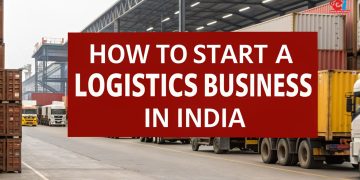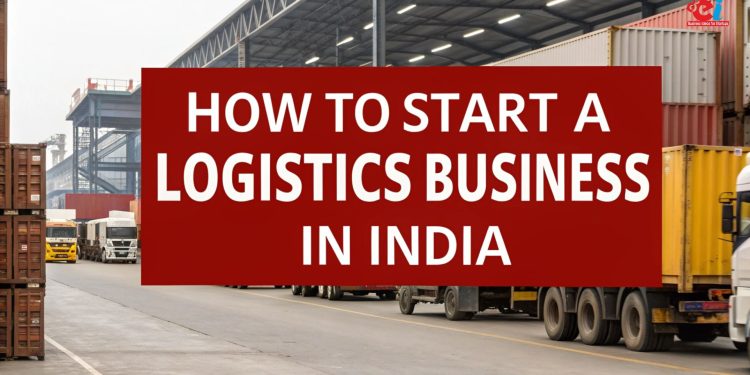The logistics business industry in India supports the nation’s economy and trade, and accounts for more than 14 percent of GDP and is growing at a rapid rate of double-digit. With the growth of pharmaceutical manufacturing exports, e-commerce, and agro-produce increases, entrepreneurs are given an opportunity once in a lifetime to create specialized logistics companies that address the sensitivity of temperatures and regulatory complexity as well as the last mile challenges. This article will take you through the steps to begin an Indian logistics company, focusing on the fastest-growing and highest-margin segment of cold-chain logistics business for pharmaceuticals as well as perishables. We’ll outline the steps you should do and the mistakes to avoid.
Finding Your Focus: Why Cold-Chain Logistics Business?
Biopharmaceutical APIs and pharmaceuticals, and fresh fruits and vegetables alike, are not able to endure temperature fluctuations without the danger from spoilage or contamination, or regulatory non-compliance. The cold chain segment thus has premium pricing and long-term growth in demand. Market estimates place its CAGR at more than 12% until 2030. In contrast to general transport, cold-chain companies require a combination of engineering, monitoring technology, and strict quality control processes. This “stickiness” means higher barriers for entry. And once you’ve established reliable and auditable processes, clients will be reluctant to switch.
Related: Top 10 Profitable Logistics Business Ideas
Understanding Market Needs
Before you invest in warehouses or trucks, get yourself in the problems faced by API producers and exporters of food. Visit the pharma parks of Pune or Visakhapatnam or Visakhapatnam; speak to quality-control managers about the rate of batch rejection related to temperature violations. Examine export data for fresh mangoes or flowers. Seasonal conditions could determine when and where you require additional capacity. The field research will provide not just volume forecasts, but also service gaps that your startup could take advantage of: maybe nobody provides integrated cold chain and reverse logistics. Or perhaps existing providers don’t have real-time IoT monitoring.
Crafting Your Business Blueprint
A well-designed business plan is more than counting numbers. Start with a crisp vision statement–“To deliver temperature-sensitive goods across India with zero-loss reliability”–and map out how each function supports that promise. Explain your operation strategy: will you own refrigerated trucks as well as cool rooms that are modular, or collaborate locally-based carriers, and rent warehouses that are certified? Explain your strategy for technology. For example, an end-to-end platform that collects IoT sensors, generates alarms automatically when temperatures change and creates regulatory-grade conformity reports. Also, define your first target area (perhaps Maharashtra and Karnataka) and a gradual expansion of Delhi-NCR and the ports in the south.
Navigating Legal and Compliance Requirements
The regulatory framework for India’s cold-chain logistics varies across several authorities. You must be registered as an Goods Transport Agency under the Motor Vehicles Act, obtain GST registration for operations that are interstate and obtain Drug Controller approval if you deal with APIs. For food products you must have an FSSAI license is required. Furthermore each cold room should be equipped with backup power systems that are calibrated temperature sensors, as well as plans for disaster recovery. Hire a compliance expert early to create SOPs (Standard Operating Procedures) that meet CDSCO’s Good Distribution practices and develop a framework for readiness audits.
Building Infrastructure and Technology
Finding the best site to build your initial warehouse is a matter of keeping in mind proximity to hubs of production as well as access to highways and the cost of real estate. A modular cold room that is prefabricated is able to be built in just a few weeks, and allows you to increase capacity as your orders increase.
For fleets begin with a tiny amount of reefer trucks that are equipped with telematics devices. real-time tracking of your location as well as temperature and humidity is your competitive advantage. The software you use should be integrated Warehouse Management (WMS) as well as Transport Management (TMS) platforms and include an API-driven mobile application for drivers, and a portal for clients which displays the status of delivery and the certificates of compliance.
Related: Most Profitable Small scale Manufacturing business Ideas for Indian Startups
Assembling Your Team
The success of a business is dependent on the people who are knowledgeable about logistics as well as the strict requirements of pharmaceutical or perishable items. Employ operations managers with cold chain experience, quality officers who are educated in GDP standards, and technicians with experience dealing with refrigeration devices. Your staff that interact with customers, including sales and account managers should be fluent in the terminology of shelf-life, traceability, batch metrics, and compliance with regulatory requirements. As you grow the business, make sure you invest in regular training programs, mock-recall exercises and other courses to ensure that your team is able to respond quickly to any occurrence of deviation.
Going to Market
Instead of using scattershot advertisements instead, concentrate your marketing efforts on trade shows, digital forums, and targeted outreach. Write whitepapers or blog articles regarding the best practices in flower exports or distribution of vaccines and establish your status as an authority. In sales meetings, present examples of the way your real-time monitoring has prevented spoilage and helped save crores of dollars in inventory lost. Forge alliances with co-packers, contract manufacturers and online platforms to access their distribution networks and speed up the acquisition of customers.
Ensuring Quality and Continuous Improvement
The cold-chain logistical process is an defect-free business. From intake inspection–where every pallet is temperature-quarantined until sensor logs are validated–to dispatch checklists that verify loading conditions, embed quality checks at every stage. Deploy machine-learning-powered analytics on your IoT data to predict which routes or vehicles are most prone to anomalies, then refine your network accordingly. Regular internal audits as well as third-party GDP assessment will keep your systems in good order and help build trust with clients and regulators alike.
For more information check out this video
Scaling for Long-Term Success
When your initial corridors are tested, replicate the hub and spoke model in different regions, such as east India for seafood and tea exports Rajasthan in Rajasthan and Gujarat as cold-storage facilities for vaccines, West Bengal for jute and agricultural commodities. Explore other related services like reverse logistics for expired or recall batch, packing solutions that incorporate material that change phase or an online freight marketplace that connects shippers to approved cold-chain suppliers. Every new product should be in line with your main competencies of dependable temperature integrity and regulatory conformity.
About Niir Project Consultancy Services (NPCS)
Niir Project Consultancy Services (NPCS) creates a comprehensive Market Survey cum Detailed Techno Economic Feasibility Reports that cover all aspects of setting up an industry. Their in-depth analyses cover manufacturing processes as well as raw material procurement design, plant layout and precise financial projections. NPCS allows entrepreneurs to make informed decisions based on the potential risks and viability of industrial ventures that are new.
Which business to start? How to choose a business idea?
Key Takeaways
The process of starting a business in logistics in India requires deep domain expertise along with strict compliance and efficient application of technology. By the focus being on perishables and pharmaceuticals–a segment that is expected to grow by over 12% a year–you place your business in a highly-value and high-barrier market where quality demands premium prices. With a well-thought-out business plan, the best team, an efficient infrastructure, and a constant focus on quality to build an enterprise in logistics which not only flourishes but also becomes a vital partner for India’s growing industries.


















